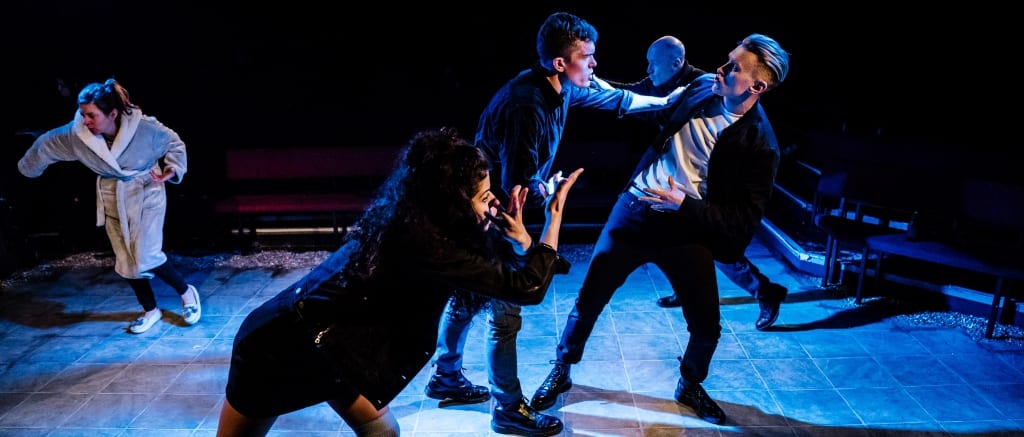East by Steven Berkoff is a comic play about London’s East End. Five characters relay tales about their shady lives in a rough district, covering the bases of romance, family and friendship. The murkiness of the action is offset by the elevated Shakespearean idiom that the characters speak in. The younger generation, Mike (James Craze), Les (Jack Condon) and Sylv (Boadicea Ricketts), form an uncomfortable ménage à trois where the darling Sylv is caught between two raging bulls. Mum (Debra Penny) and Dad (Russell Barnett), who are part of the older generation, watch over the younglings, often reminiscing about the good old days.
The coming-of-age theme is explored in a punch-drunk world. Mike and Les are two Cockney lads who are full of masculine energy and vigour. They have a disagreement over the affections of Sylv and hold razors at each other’s throats (and testicles). These snarling blokes are products of an upbringing where questions of honour are resolved in blood. The moments of violent tension are catalysed into a conflict by a braying crowd, who hurl profanities into the mix as the pair squares off. However, the eventual fight does not embitter them, but instead cements their friendship, after Mike and Les hobble to Charing Cross Hospital to bond as they recuperate.
Scene shifts are marked by vaudeville skits. These lighter comic exchanges are great ways to navigate the changes in time and location. We move away from the makeshift fighting arena behind a cinema to a breakfast table in two-up two-down. Mum is an easy-going domesticated woman, languorously contemplating the Radio Times crossword, and Dad is a furious misanthrope: it seems that sloth and wrath loom over Mike, Les and Sylv in the form of these parents. This tedium is what awaits the trio in the future should they fail to escape their surroundings.
Sylv is the most sensitive to the fear of smashed dreams. She can fancy her suitors at one point, with their raw virile charm, but also deplore herself being boxed into this role of ‘Queen of Sluts’ when she has to prettify herself and lay herself down (pun intended) for these men. On the other hand, if the role is reversed, a man who sleeps about is known an alpha-male player; there is less stigma attached. But Berkoff does not cast Sylv as plainly a man-hating feminist: her heartfelt oscillations between infatuation and disgust decry the sorry state of affairs that women have to suffer at the hands of belligerent apes, whom they are unfortunately attracted to.
East was performed in The King’s Head Theatre forty years ago: its return to this space has a kind of pleasing circularity to it. The venue is cosy, so the ornate language is a great way to account for the relative simplicity of the set design. These Renaissance inflections to ordinary speech, grandiose metaphors of foggy breath being dragon smoke, help paint such a vivid scenes that go into this panorama of the East End. The vernacular does not only serve the purpose of a hilarious dichotomy between low and high, for such courtly speech could not come from more unsuspecting mouths, but also makes a display of Berkoff’s writing prowess, so much so that the hard and grotesque textures of the back alleys and side streets can be felt and smelled in the performance.

